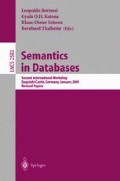Abstract
We investigate cardinality constraints of the form M ↪θ K, where M is a set and θ is one of the comparison operators “=”, “≤”, or “≥”; such a constraint states that “exactly”, “at most”, or “at least”, respectively, K elements out of the set M have to be chosen.
We show how a set C of constraints can be represented by means of a positive-disjunctive deductive database P C , such that the models of P C correspond to the solutions of C. This allows for embedding cardinality constraints into applications dealing with incomplete knowledge.
We also present a sound calculus represented by a definite logic program P cc , which allows for directly reasoning with sets of exactly-cardinality constraints (i.e., where θ is “=”). Reasoning with P cc is very efficient, and it can be used for performance reasons before P C is evaluated. For obtaining completeness, however, P C is necessary, since we show the theoretical result that a sound and complete calculus for exactly- cardinality constraints does not exist.
Access this chapter
Tax calculation will be finalised at checkout
Purchases are for personal use only
Preview
Unable to display preview. Download preview PDF.
References
S. Ceri, G. Gottlob, L. Tanca: Logic Programming and Databases, Springer, 1990.
P. Van Hentenryck, Y. Deville: The Cardinality Operator: A new Logical Connective for Constraint Logic Programming, Proc. 8th Intl. Conference on Logic Programming 1991 (ICLP’91), MIT Press, 1991, pages 745–759.
R. Kaye: Minesweeper is NP-complete, Mathematical Intelligencer, 22(2), 2000, pages 9–15.
J.W. Lloyd: Foundations of Logic Programming, Second Edition, Springer, 1987.
J. Lobo, J. Minker, A. Rajasekar: Foundations of Disjunctive Logic Programming, MIT Press, 1992.
K. Marriott, P. Stuckey: Programming with Constraints-An Introduction, MIT Press, 1998.
J. Minker, A. Rajasekar: A Fixpoint Semantics for Disjunctive Logic Programs. Journal of Logic Programming, 9(1), 1990, pages 45–74.
I. Niemelä, P. Simmons: Extending the Smodels System with Cardinality and Weight Constraints, In Jack Minker (ed.): Logic-Based Artificial Intelligence, Kluwer, 2000, pages 491–522.
D. Seipel, J. Minker, C. Ruiz: Model Generation and State Generation for Disjunctive Logic Programs, Journal of Logic Programming, 32(1), 1997, pages 48–69.
D. Seipel, H. Thöne: DisLog-A System for Reasoning in Disjunctive Deductive Databases, Proc. Intl. Workshop on the Deductive Approach to Information Systems and Databases 1994 (DAISD’94), pages 325–343.
D. Seipel: DisLog-A Disjunctive Deductive Database Prototype, Proc. 12th Workshop on Logic Programming (WLP’97), 1997, pages 136–143. DisLog is available at http://www-info1.informatik.uni-wuerzburg.de/databases/DisLog.
D. Seipel, U. Geske: Cardinality Constraints in Disjunctive Deductive Databases, In Workshop on Deductive Databases and Logic Programming (DDLP’2000) at the International Conference on Applications of Prolog (INAP’2000), 2000.
A.H. Yahya: Minimal Model Generation for Refined Answering of Generalized Queries in Disjunctive Deductive Databases. Journal of Data and Knowledge Engineering, 34(3), 2000, pages 219–249.
Author information
Authors and Affiliations
Editor information
Editors and Affiliations
Rights and permissions
Copyright information
© 2003 Springer-Verlag Berlin Heidelberg
About this paper
Cite this paper
Seipel, D., Geske, U. (2003). Cardinality Constraints in Disjunctive Deductive Databases. In: Bertossi, L., Katona, G.O.H., Schewe, KD., Thalheim, B. (eds) Semantics in Databases. SiD 2001. Lecture Notes in Computer Science, vol 2582. Springer, Berlin, Heidelberg. https://doi.org/10.1007/3-540-36596-6_10
Download citation
DOI: https://doi.org/10.1007/3-540-36596-6_10
Published:
Publisher Name: Springer, Berlin, Heidelberg
Print ISBN: 978-3-540-00957-3
Online ISBN: 978-3-540-36596-9
eBook Packages: Springer Book Archive

